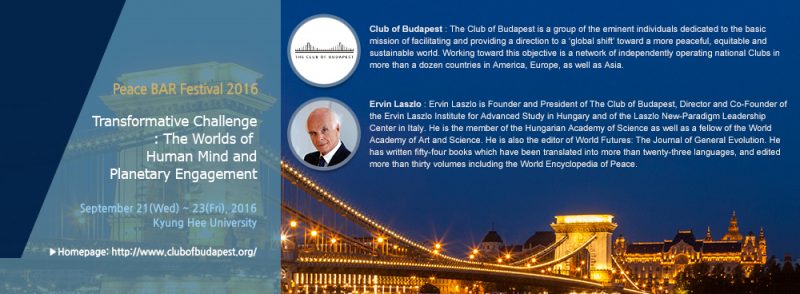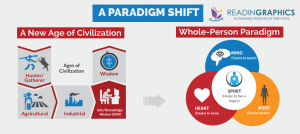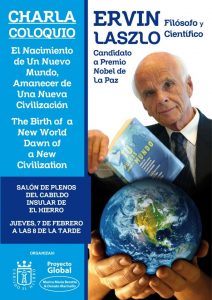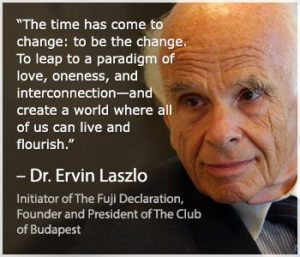Wisdom at the Tipping Point
Shifting to New Thinking and a New Civilization
“Where there is no vision, the people perish” Proverbs 29:18, Old Testament
“No problem can be solved from the same level of consciousness that created it” Albert Einstein
1. We, the members of the World Wisdom Council, are committed to the reversal of current trends towards chaos and destruction. We believe that the world can be constructively changed; a new civilization can be created. We call on governments, businesses, educators, artists, scientists, activists and all concerned citizens to join their commitment to ours. We call on people in every walk of life to become aware of the critical nature of the world situation and use the power of new thinking and acting to bring about the necessary changes.
2. The wise people of all traditions have admonished us to see humanity as one family, to honor the sanctity of life and creation, to nurture love and compassion and to apply the golden rule of treating others as we want to be treated ourselves. For the first time in history, the application of this wisdom is not only a precondition of personal growth and fulfillment, but also a precondition of humansurvival.
3. Neither breakdown in chaos nor breakthrough to a new civilization is fated. The future is not to be foretold, it is to be created. It can be decisively formed by every human being endowed with bothconsciousness and conscience. There are workable alternatives to the way we do things in the world today that could help us deflect the trends that move us toward crisis and pave the way toward a more sustainable and peaceful new civilization.
4. A basic cause of unsustainability is the dysfunctional and egocentric thinking that gives rise to perceptions and priorities that lead to destructive conduct. The basic remedy is the transformation of the prevalent mindset. In this context “mindset” embraces rational as well as intuitive, cognitive as well as emotional elements: the full scope of human consciousness.
5. Humanity’s great wisdom traditions, east and west, north and south, concur that asking fundamental questions is a vital step in the awakening of wisdom, as they help us see and experience the essential link between our consciousness and its immediate tangible effect on our life. These questions awaken higher, more integral forms of intelligence that can initiate the olution,
dissolution and resolution of the problems we all currently face.
6. There are some fundamental questions we need to ponder. They include questions such as:
>Can we make wealth, power, and technology serve us, instead of enslaving us?
>Can we have peace within and among ourselves without living in peace with nature?
>Can we have a peaceful and sustainable world without understanding how others view the world?
>Can we afford to ignore the intrinsic wisdom present in traditional cultures and present also in young children when it comes to conducting our life in modern societies?
>Must we not question whether modern practices truly bring justice to law, healing tomedicine, and sustainability to the conduct of politics and business?
>Can we transform in time the prevalent glorification of greed, lust and power into a mindset hallmarked by dedication to justice for everyone, and respect for all people whether they live in our culture and society or in others?There are also more practical questions we should ask. For example: Where is the wisdom in asystem that –
>Produces weapons that are more dangerous than the conflicts they are meant to solve and substitutes a cult of violence for a culture of peace?
>Continues to undervalue women and abandons half of its children in poverty and hunger?
>Creates an overproduction of food, but fails to make it available to the hungry?
>Ignores the very principles of fairness and justice that we ask our children to follow?
>Expects individuals to abide by the golden rule of treating others as they would be treated themselves, yet ignores this elementary rule of fairness in relations among states and among businesses?
>Faces a gamut of tasks and challenges, yet puts more and more people out of work?
>Requires unrelenting economic and financial growth for it to function and not to crash?
>Faces long-term structural and operational problems, yet bases its criteria of success on short-term accounting periods and the day-to-day behavior of stock exchanges?
>Assesses social and economic progress in terms of the gross national product and leaves out of account the quality of life of the people and the level of fulfillment of their basic human needs?
>Gives full priority to maximizing the productivity of labor (even though millions are unemployed or underemployed) rather than improving the productivity of resources (notwithstanding that most natural resources are finite and many are scarce and nonrenewable)?
>Fights religious fundamentalism but enshrines “market fundamentalism” (the belief that the market can right all wrongs and solve all problems)?
7. We conclude that the question is no longer whether a fundamental change is coming, but whether the change will be for the better or for the worse, when it will be coming and at what price. The sooner we pave the way to positive change, the less traumatic will be the transformation and the smaller its human, economic and ecological cost. All of us now share the responsibility of realizing that we live at the tipping point of contemporary civilization and for recognizing that informed thinking and responsible acting are needed to bring us to the threshold of a civilization that is truly peaceful and sustainable.
P.S. “LIGHT IN ACTION” co-signs the above declaration and is committed to serving its goals










